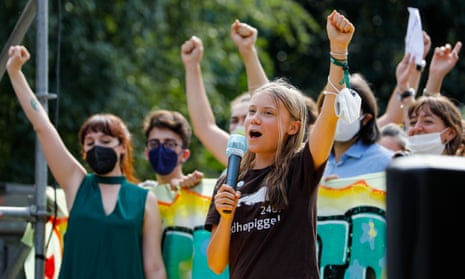We are supposed to have solved this problem in just under 30 years. That’s the same amount of time that has elapsed since Whitney Houston and Kevin Costner smooched in The Bodyguard. Governments’ commitment to limit global heating to 1.5C above the preindustrial average means the huge transition to net zero will have to be made by 2050. By then, renewables should be producing most of our energy – certainly all the electricity in rich countries – and we should all be driving around in electric cars, eating sustainable, mainly plant-based foods and living in well-insulated houses built from low-carbon materials. The many books written about how to avoid the climate crisis will hopefully have become obsolete. Which of them will survive to be read beyond the combustion era, if only by historians – as testament to this period of crisis and uncertainty?
Well, Greta Thunberg is already assured her place in history as the Jeanne d’Arc (or Cassandra) of our time. She’s been heroically battling the forces of climate inaction and denial since she stepped on to the global stage as a shy 15-year-old schoolkid “striking for the climate”. Anything written or orchestrated by her – like this appealingly produced anthology of essays – stands an excellent chance.
Thunberg herself writes with the stark conviction of youth and an activist’s directness, which is both refreshing to read and tiring. Fortunately, space is given to writers who weave messages with skill and beauty, like Peter Brannen, who takes the chemistry of the carbon cycle and presents it as the marvellous life force it is. Warning us where we’re heading, he evokes an episode of global warming from Earth’s history: “In the aftermath, when the fever finally broke, one could travel the world without seeing a tree, the world’s coral reefs had been replaced by bacterial slime, the fossil record went silent and the planet took nearly 10 million years to pull itself back from oblivion.”
Naomi Oreskes writes fiercely about “the history of denial and obfuscation by the fossil fuel industry”, and there are stirring contributions from the climate scientist Kate Marvel and the novelist Amitav Ghosh. This is a campaigning book of course, but much more than that. There are clear explanations of how human activities are pushing Earth’s systems close to dangerous tipping points, and of the socioeconomic drivers of the crisis.
We are told throughout that if we don’t limit global temperature rises to 1.5C, we face disaster, yet planned fossil fuel production by 2030 will be more than twice the amount consistent with this target. In short, we are very unlikely to meet our transition target by 2050. What then? In a book of more than 400 pages, just one and a half are given over to technologies aimed at reducing global heating by reflecting sunlight back into space. That particular essay can be summed up in a quote: “Geoengineering is not an option.” The idea of withdrawing emitted carbon from the atmosphere gets a little more (reluctant) attention, because “we’ve left Greta’s generation little choice”. Nuclear power is barely mentioned even though decarbonising energy systems is fundamental to this effort.
For all Thunberg’s brilliance and bravery, ignoring these possibilities feel timorous and blinkered. This book is superb at explaining the urgency and importance of preventing climate change, but despite its heft it stops too soon. There is little pragmatism over what to do about now-certain changes, which means it feels like a book whose time was 10 years ago. But perhaps it has taken this decade for an audience that’s receptive to its message to develop. History will show.
